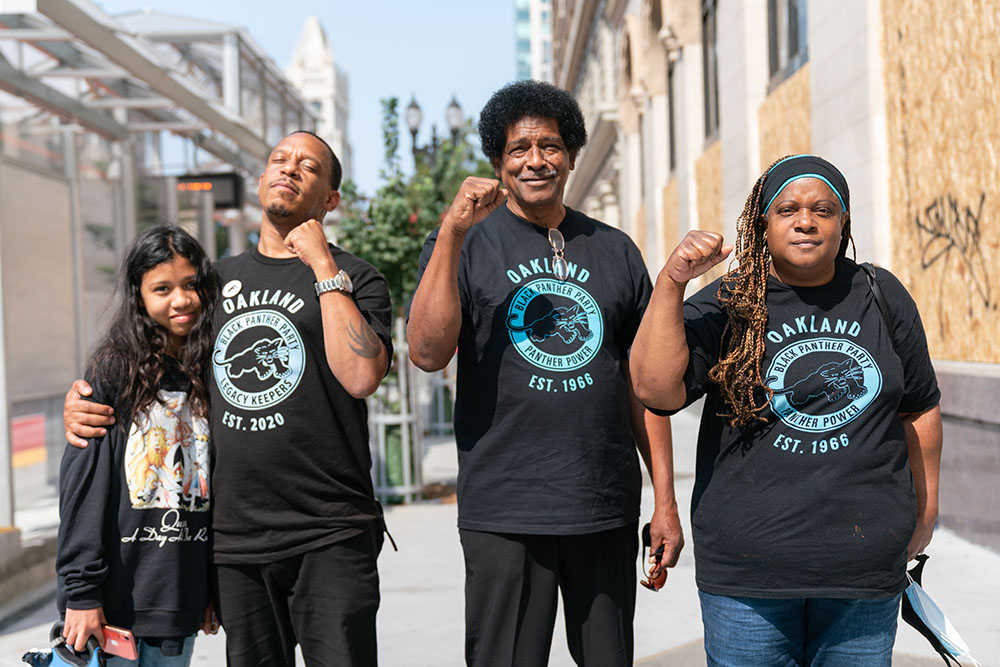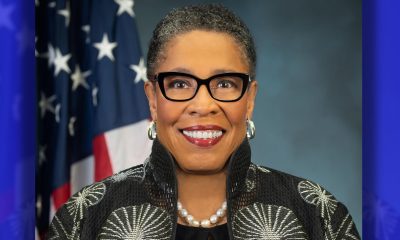#NNPA BlackPress
Legacy Keepers Bridge Gap Between Black Panthers and BLM

The original Black Panther Party (1966-1982) left behind a legacy that is often side-lined by the imagery of Black men and women carrying guns in self-defense while wearing black berets and leather jackets. The legacy had been stifled as many party members became political prisoners, and without knowing it at the time, targets of an FBI program called COINTELPRO meant to destroy the party using various deceptive tactics.
With programs like free breakfast and lunch for school children, free health clinics and educational institutions, the BPP created over 60 documented community programs they called survival programs. Many of these programs have become a blueprint for activists today. The BPP created these programs acknowledging that the government was not going to come to communities and do the work of improving them, so the communities had to organize and build structural programs for themselves.
Founded in Oakland, with branches eventually spreading all over the U.S., the BPP believed the only way to create economic stability and self-sufficiency in Black communities was through a combined effort of the people who are from and part of their communities. That is where the term they often use, “All Power to the People,” comes from.
After the death of George Floyd sparked historical nationwide protests under the banner of Black Lives Matter, activists eagerly called original BPP member Saturu Ned looking for advice on how to maneuver what they saw as a modern-day revolution. Formerly known as James Mott, Ned became a BPP member in 1968 and was a member of the BPP’s Lumpen Band. He also taught at Oakland Community School, an award-winning school created by the BPP.
Amin Cooley was one of those activists who called Ned feeling frustrated and angry after watching the video of George Floyd’s death by police officers in Minneapolis, Minnesota. Cooley is from Oakland and was raised in a time when crack cocaine dominated the streets. He saw how it affected his community. He looked up to the BPP legacy but admits he did not know too much about its history.
When he was young, he went to see ‘Panther’ a film directed and written by Mario Van Peebles. “And this was like, a secret premiere, and I was like ‘wow, this is the first time I actually get to meet some Black Panthers,’” Cooley said. When he attended the premier he was not able to build up the nerve to talk to the original members who were present, but he remembered the movie making a big impression on him.
“It was about the community and I wanted to be a part of that. And I’ve always looked up to them my whole life. And when George Lloyd was murdered by the police, I cried, I cried really hard,” Cooley said. After sleeping all day he said he woke up the next day, “with a fire in my heart and my soul.”
Cooley reached out to a friend who knew Ned. Cooley said he told his friend, “We got to see the Black Panther Party back or at least the programs and the ideology because they have the blueprint in their head.”
Cooley connected with Ned, and they both became co-founders of B.P.P. Legacy Keepers. Under one non-profit with contributions being tax-deductible through the Pledge Group Foundation 501(c)3, B.P.P., Legacy Keepers is seeking to build a network of “legacy keepers” who are already doing community work as well as educate anyone who wants to bridge the gap of knowledge from the time of the BPP to the present.
Being an original Black Panther Party member is not required to be a legacy keeper. Anyone who is doing work similar to that of the original BPP like providing food, healthcare, housing, and legal support would be considered a legacy keeper of the original movement.
Calling for national access-for-all healthcare, advocating for affordable housing, working towards changing the justice system, all of these current-day political discussions fall in line with the BPP 10-point program.
The problem, Ned explained, is that today there is no clear leadership or messaging. He calls the current cycle of video recordings of Black people being killed by police followed up with marches and a hashtag to donate money a “death march” that has no clear vision or accountability. Marching has the purpose of raising attention to a problem, he said, but there is work to be done beyond that.
Legacy Keepers instructs their network users in the methodology of identifying what’s going on in communities and figuring out how to resolve community issues and problems. The problems are intertwined, so working on the idea of police reform or defunding the police would have to collate with other issues in communities, like healthcare, mental health, job security, housing, and food security.
Instruction is based on the BPP legacy using modern technology like classes over Zoom and studying how video phones and social media can be used for effective strategies.
With Ned’s wife, Dr. Zafirah Ned, other instructors available to teach these classes include Katherine Campbell, (Auntie) Francis Moore, and Professor Steve McCutchen. The B.P.P. Legacy Keepers network includes hundreds of individuals, organizations and businesses all over the country.
Cooley represents the younger generation who is learning under the guidance of Ned and will be an instructor as well. Saturu Ned has already done classes on Zoom to universities like Fresno State.
“We are giving classes to policymakers on a national basis, giving Zoom presentations to individuals who want to see how they can actually increase the effectiveness of their organizations,” Ned said. “with other organizations…switching from the concept of just Black Lives Matter, first the historical classes, and then the ideology. We’ll separate myths from fact.” The purpose Ned said, is to start conversations into specific plans and to turn plans into action.
“You’re talking about defunding the police. Every time we hear that, do we not ask where’s your plan?” Ned said. So far, he said he has not heard a concept with a detailed plan that could feasibly be turned into action, and that is a problem that organizing and educating current day legacy keepers can solve.
For more information go to bpplegacykeepers.com.
#NNPA BlackPress
IN MEMORIAM: Ramona Edelin, Influential Activist and Education Advocate, Dies at 78
NNPA NEWSWIRE — Born on September 4, 1945, in Los Angeles, California, activist Ramona Edelin’s early years were marked by a commitment to education and social justice. According to her HistoryMakers biography, after graduating from Fisk University with a Bachelor’s degree in 1967, she pursued further studies at the University of East Anglia in England. She earned her master’s degree before completing her Ph.D. at Boston University in 1981.
The post IN MEMORIAM: Ramona Edelin, Influential Activist and Education Advocate, Dies at 78 first appeared on BlackPressUSA.

By Stacy M. Brown, NNPA Newswire Senior National Correspondent
@StacyBrownMedia
Once upon a time, Black Americans were simply known as colored people, or Negroes. That is until Ramona Edelin came along. The activist, renowned for her pivotal roles in advancing civil rights, education reform, and community empowerment, died at her D.C. residence last month at the age of 78. Her death, finally confirmed this week by Barnaby Towns, a communications strategist who collaborated with Dr. Edelin, was attributed to cancer.
Born on September 4, 1945, in Los Angeles, California, Edelin’s early years were marked by a commitment to education and social justice. According to her HistoryMakers biography, after graduating from Fisk University with a Bachelor’s degree in 1967, she pursued further studies at the University of East Anglia in England. She earned her master’s degree before completing her Ph.D. at Boston University in 1981.
Edelin’s contributions to academia and activism were manifold. She was pivotal in popularizing the term “African American” alongside Rev. Jesse L. Jackson in the late 1980s.
Jackson had announced the preference for “African American,” speaking for summit organizers that included Dr. Edelin. “Just as we were called Colored, but were not that, and then Negro, but not that, to be called Black is just as baseless,” he said, adding that “African American” “has cultural integrity” and “puts us in our proper historical context.”
Later, Edelin told Ebony magazine, “Calling ourselves African Americans is the first step in the cultural offensive,” while linking the name change to a “cultural renaissance” in which Black Americans reconnected with their history and heritage.
“Who are we if we don’t acknowledge our motherland?” she asked later. “When a child in a ghetto calls himself African American, immediately he’s international. You’ve taken him from the ghetto and put him on the globe.”
The HistoryMakers bio noted that Edelin’s academic pursuits led her to found and chair the Department of African American Studies at Northeastern University, where she established herself as a leading voice.
Transitioning from academia to advocacy, Edelin joined the National Urban Coalition in 1977, eventually ascending to president and CEO. During her tenure, she spearheaded initiatives such as the “Say Yes to a Youngster’s Future” program, which provided crucial support in math, science, and technology to youth and teachers of color in urban areas. Her biography noted that Edelin’s efforts extended nationwide through partnerships with organizations like the National Science Foundation and the United States Department of Education.
President Bill Clinton recognized Edelin’s expertise by appointing her to the Presidential Board on Historically Black Colleges and Universities in 1998. She also co-founded and served as treasurer of the Black Leadership Forum, solidifying her standing as a respected leader in African American communities.
Beyond her professional achievements, Edelin dedicated herself to numerous boards and committees, including chairing the District of Columbia Educational Goals 2000 Panel and contributing to the Federal Advisory Committee for the Black Community Crusade for Children.
Throughout her life, Edelin received widespread recognition for her contributions. Ebony magazine honored her as one of the 100 Most Influential Black Americans, and she received prestigious awards such as the Southern Christian Leadership Award for Progressive Leadership and the IBM Community Executive Program Award.
The post IN MEMORIAM: Ramona Edelin, Influential Activist and Education Advocate, Dies at 78 first appeared on BlackPressUSA.
#NNPA BlackPress
Tennessee State University Board Disbanded by MAGA Loyalists as Assault on DE&I Continues
NNPA NEWSWIRE — Recent legislative actions in Tennessee, such as repealing police reform measures enacted after the killing of Tyre Nichols, underscore a troubling trend of undermining local control and perpetuating racist agendas. The new law preventing local governments from restricting police officers’ authority disregards community efforts to address systemic issues of police violence and racial profiling.
The post Tennessee State University Board Disbanded by MAGA Loyalists as Assault on DE&I Continues first appeared on BlackPressUSA.

By Stacy M. Brown, NNPA Newswire Senior National Correspondent
@StacyBrownMedia
Tennessee State University (TSU), the state’s only public historically Black college and university (HBCU), faces a tumultuous future as Gov. Bill Lee dissolved its board, a move supported by racist conservatives and MAGA Republicans in the Tennessee General Assembly, who follow the lead of the twice-impeached, four-times indicted, alleged sexual predator former President Donald Trump. Educators and others have denounced the move as an attack on diversity, equity, and inclusion (DE&I) and a grave setback for higher education.
Critics argue that TSU’s purported financial mismanagement is a manufactured crisis rooted in decades of underinvestment by the state government. They’ve noted that it continues a trend by conservatives and the racist MAGA movement to eliminate opportunities for Blacks in education, corporate America, and the public sector.
Gevin Reynolds, a former speechwriter for Vice President Kamala Harris, emphasizes in an op-ed that TSU’s financial difficulties are not the result of university leadership because a recent audit found no evidence of fraud or malfeasance.
Reynolds noted that the disbanding of TSU’s board is not an isolated incident but part of a broader assault on DE&I initiatives nationwide. Ten states, including Tennessee, have enacted laws banning DE&I policies on college campuses, while governors appointing MAGA loyalists to university trustee positions further undermine efforts to promote inclusivity and equality.
Moreover, recent legislative actions in Tennessee, such as repealing police reform measures enacted after the killing of Tyre Nichols, underscore a troubling trend of undermining local control and perpetuating racist agendas. The new law preventing local governments from restricting police officers’ authority disregards community efforts to address systemic issues of police violence and racial profiling.
The actions echo historical efforts to suppress Black progress, reminiscent of the violent backlash against gains made during the Reconstruction era. President Joe Biden warned during an appearance in New York last month that Trump desires to bring the nation back to the 18th and 19th centuries – in other words, to see, among other things, African Americans back in the chains of slavery, women subservient to men without any say over their bodies, and all voting rights restricted to white men.
The parallels are stark, with white supremacist ideologies used to justify attacks on Black institutions and disenfranchise marginalized communities, Reynolds argued.
In response to these challenges, advocates stress the urgency of collective action to defend democracy and combat systemic racism. Understanding that attacks on institutions like TSU are symptomatic of broader threats to democratic norms, they call for increased civic engagement and voting at all levels of government.
The actions of people dedicated to upholding the principles of inclusivity, equity, and justice for all will determine the outcome of the ongoing fight for democracy, Reynolds noted. “We are in a war for our democracy, one whose outcome will be determined by every line on every ballot at every precinct,” he stated.
The post Tennessee State University Board Disbanded by MAGA Loyalists as Assault on DE&I Continues first appeared on BlackPressUSA.
#NNPA BlackPress
Braxton Haulcy and the Expansion of Walker|West Music Academy
May 24, 2023 – Walker West Music Academy gets an early start on expansion. Join us for a Wednesday episode of The …
The post Braxton Haulcy and the Expansion of Walker|West Music Academy first appeared on BlackPressUSA.

May 24, 2023 – Walker West Music Academy gets an early start on expansion. Join us for a Wednesday episode of The …
The post Braxton Haulcy and the Expansion of Walker|West Music Academy first appeared on BlackPressUSA.
-

 Activism4 weeks ago
Activism4 weeks agoOakland Post: Week of March 27 – April 2, 2024
-

 #NNPA BlackPress4 weeks ago
#NNPA BlackPress4 weeks agoBeloved Actor and Activist Louis Cameron Gossett Jr. Dies at 87
-

 Community2 weeks ago
Community2 weeks agoFinancial Assistance Bill for Descendants of Enslaved Persons to Help Them Purchase, Own, or Maintain a Home
-

 Activism3 weeks ago
Activism3 weeks agoOakland Post: Week of April 3 – 6, 2024
-

 Business2 weeks ago
Business2 weeks agoV.P. Kamala Harris: Americans With Criminal Records Will Soon Be Eligible for SBA Loans
-

 Activism2 weeks ago
Activism2 weeks agoOakland Post: Week of April 10 – 16, 2024
-

 Community2 weeks ago
Community2 weeks agoAG Bonta Says Oakland School Leaders Should Comply with State Laws to Avoid ‘Disparate Harm’ When Closing or Merging Schools
-

 Community1 week ago
Community1 week agoOakland WNBA Player to be Inducted Into Hall of Fame























































